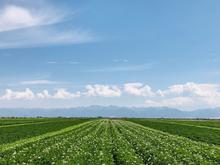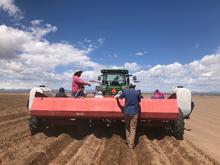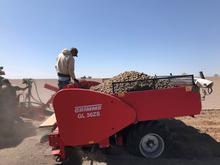As part of its mission, Mosca-Hooper Conservation District is highlighting on its website and newsletter, farms within its territory currently utilizing soil and water conservation practices and technologies.The following is the result of an interview conducted by District Supervisor Bob Rice with Brian Brownell and Anna Osterhout.
Zapata Seed Company
The San Luis Valley produces a significant quantity of seed potatoes, with approximately 10,000 acres dedicated to this endeavor. One prominent producer is Zapata Seed Company, located 12 miles north of Alamosa. The founder of Zapata Seed Company is Brian Brownell, who grew up on the labor-intensive flood irrigated farm of his parents, John (Bud) Brownell and Mildred (Mickie) Brownell. Brian followed his parents in an agricultural career after graduating from CSU.
Center pivot irrigation systems were introduced into San Luis Valley potato farming in the early 1970’s. After adopting center pivot technology several new acreages were developed over the next two decades. , Seed potato production became the focus of work in 1993. Currently Brian is joined by his daughter Anna Osterhout and son Patrick Brownell in the management of the operation. They manage 17 irrigation pivot circles in north Alamosa County and the surrounding area. Zapata Seed Company has 17 full time employees and during harvest up to 40 employees are present. Two mechanical shops are on site to deal with the complex potato production machinery.
Brian is described by Anna as a conscientious and detail oriented agricultural manager, with a keen ability to prepare well and anticipate problems. The area around the garages, shops and storage buildings of the home farm is noticeably neat and tidy. Brian has met most measures of success in the potato farming arena and continues to enjoy being active in the day to day operations.
I met with Brian and Anna on June 21 in their administrative office to talk about water conservation, soil health, cover cropping, and technology. The following outlines some of our discussion.
Soil Health
Zapata Seed Company utilizes various cover crops including radish, mustard, rye, and sudan grass. Cover crops are irrigated lightly after planting. There is no tilling of cover crops. Brian believes that wind erosion is significantly diminished with successful cover cropping. Cover crops of radish and mustard produce a biological toxin which can help control nematodes. Cover cropping and compost tea applications are essential elements of the operation.
Zapata Seed Company participates in the Conservation Reserve Enhancement Program (CREP), administered by the USDA Farm Service Agency which re-establishes stable vegetation on an irrigated acreage by keeping it out of production for a number of years. Zapata Seed Company has been recognized for promoting soil conservation by the Colorado Association of Conservation Districts.
Technology and Water Conservation
Zapata Seed Company utilizes moisture sensor technology. The sensors and software result in real time computer access to irrigation activity. Irrigation is managed electronically by the soil sensors and associated software. Graphic representation of shallow and deep soil moisture is instantaneously available for each the soil sensor sites. Anna believes that soil moisture sensor technology is a key water conservation tool. Using this technology, an overcast day that results in retention of soil moisture is translated into a more conservative irrigation schedule in real-time.
Equipment and Maintenance
Potato agriculture uses complex machinery for harvesting and planting, as any observer can confirm. Zapata Seed Company maintains two shops and two full time mechanics. They have developed enough specialized mechanical expertise that they feel it often advantageous to buy used equipment that is repaired and maintained on site.
Seed Potato Pathogens
Seed potato production involves intense monitoring of soil and crops. Those that are not certified may be sold as produce. Attention to detail is a crucial issue in seed potato production. Seed potato producers must maintain a working knowledge of pathogen related microbiology and virology.
While several potato pathogens are treatable, Brian notes that the mosaic virus is particularly difficult to manage due to lack of visible early infection markers and the lack of effective treatment. Aphids are the principal vector, and their control is problematic. The virus will only be managed by intense monitoring. New scientific advances concerning mosaic virus are eagerly awaited.
Mosca-Hooper Conservation District is a special district within the State of Colorado responsible for facilitating natural resource conservation opportunities for landowners within Alamosa County. The District’s efforts at incentivizing soil and water conservation and soil health building practices are long-standing, working alongside farmers and ranchers in the region to implement voluntary conservation efforts and regenerative farming practices. Mosca-Hooper Conservation District is a member of the Rio Grande Watershed Association of Conservation Districts, and financially supports the educational work of the Rio Grande Watershed Conservation and Education Initiative (RGWCEI), and the advocacy and education work of the Colorado Association of Conservation Districts (CACD) and the National Association of Conservation Districts (NACD) around soil health and watershed stewardship.
Each of the above organizations assists the District in informing a broader audience of landowners, policy makers, and members of the general public about our soil health and watershed stewardship efforts.



